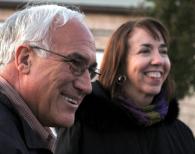Not In Our Town will be in Phoenix at the Congress of Cities & Exposition, the annual conference from our partners at the National League of Cities.
Join our Executive Producer Patrice O'Neill and Patchogue, N.Y. Mayor Paul Pontieri for a film presentation from Not In Our Town: Light in the Darkness on Friday, at 4:30 p.m. The discussion following the presentation will be moderated by Roeland Park, KS Mayor Adrienne Foster.
Not In Our Town: Light in the Darkness is a one-hour documentary about a town coming together to take action after anti-immigrant violence devastates the community. In this short film below—featured on the Light in the Darkness DVD—Mayor Paul Pontieri reflects on his family's history of immigration, his love of his hometown, and how his life has influenced his policy of inclusion for all Patchogue residents.
city leaders
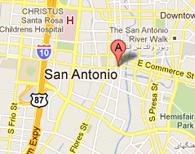
San Antonio’s KLRN joined communities across the nation in addressing hate by hosting a screening of Not In Our Town: Light in the Darkness in conjunction with the Not In Our Town National Week of Action. The public television station teamed up with the peaceCenter for the screening and a community discussion, both held at the center on Sept. 20.
With more than 40 attendees and an insightful discussion about issues facing the San Antonio community, the event was a “great success,” according to KLRN’s Education Associate Jennifer Herrera.
Panelists included Winifred Barnum-Newman, executive director of Race Unity Day; Hisham Batar, assistant director of the Refugee Program at Catholic Charities; as well as Making Efforts to Reach Out to the Community sponsor JoAnn Jin Mena; and Jonathan Ryan, executive director of Refugee and Immigrant Center for Education and Legal Services.

On Sept. 21—the day our film, Not In Our Town: Light in the Darkness premiered on PBS—San Francisco declared it Not In Our Town Day.
The proclamation, signed by San Francisco Mayor Edwin M. Lee, was presented to Not In Our Town Executive Director Jonathan Bernstein at a special Human Rights Commission meeting last night. The City and County of San Francisco's Human Rights Commission had called the meeting to explore hate crime trends and anti-bullying efforts.
The proclamation states that: "Not In Our Town has motivated thousands of people to develop their own initiatives to overpower hateful actions and voices in our communities" and "the City and County of San Francisco is proud to recognize Not In Our Town's Week of Action, which takes place from September 18-24, during which time people across the country are taking action to build communities that are inclusive for everyone."
For Bernstein, the proclamation will encourage others to speak out against hatred.

Last week, the nation was stunned by the brutal anti-gay beating and torture of two teen boys and a 30-year-old man in the Bronx, New York.
New York Mayor Bloomberg stepped up and made a strong statement publicly denouncing anti-gay violence: “When any New Yorker is attacked because of who they are or who they love, the fabric that binds us together is torn. That's why these attacks are attacks on us all -- and why they can never, ever be allowed. Especially when it comes to our kids."
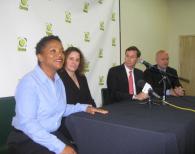
Oregon has just made it easier to report hate crimes--do it online.
That's what the Department of Justice came up with after a meeting of the LGBT community in Portland, called in response to gay-bashings in the city.
Sean Riddell (pictured above, on right), chief counsel for the criminal justice division of Oregon’s Department of Justice, was at the meeting, and was “struck by the number of people who said they’d been the victim of a hate crime and didn’t report it,” says Tony Green, Riddell’s colleague and DOJ spokesman.
Why don't people report hate crimes? Fear of retribution; embarrassment; maybe it's too hard to walk into a police station and fill out the forms. There are a lot of reasons; and that concerned the state's attorney general.
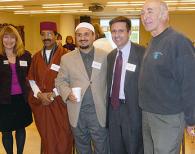
San Francisco, CA- The community turned out in force for yesterday's Not In Our Town meeting at the San Francisco Public Library. Nearly 50 people representing city agencies, law enforcement, faith-based organizations and ethnic advocacy groups shared ideas, suggested ongoing actions, and stayed on to chat long after the coffee ran out.
Some have pledged to join the SF Network, a group for people in the San Francisco Bay Area who want to stop prejudice, bigotry, intolerance and hate-based violence in the city, and wish to share ideas, information and resources with like-minded fellows. Victor Hwang, Hate Crime Prosecutor for the San Francisco District Attorney's Office (pictured at left), was one of several attending who offered concrete suggestions for ongoing actions.
To learn more about the gathering, read this post from blogger Fran Johns, a board member of the San Francisco Interfaith Council.
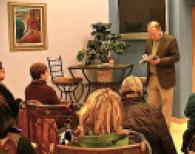
Fort Collins, CO: How do you open up a conversation about challenging issues in your town? The Not In Our Town Alliance in Fort Collins formed a book club dedicated to exploring issues of acceptance and inclusion in their community.
This winter, Mayor Doug Hutchinson led a discussion of The Tortilla Curtain, which was chosen to generate discussion about immigration issues.
A Deputy Attorney General Reflects on the Power of NIOT
By Paul Sheridan, Deputy Attorney General for the Civil Rights Division of the West Virginia Attorney General's Office

How Twin Cities in Illinois Adopted Not In Our Town
By Mike Matejka, Bloomington-Normal Not In Our Town
After Billings, Montana, perhaps no other community has the Not In Our Town history that the twin cities of Bloomington and Normal, Illinois have.
After the recent beating of Brandon Manning, a 24-year-old African American resident, the Richmond chapter of the NAACP called a vigil in El Sobrante, CA on Feb. 5, 2009, to support Manning and his family.
Two dozen community members joined city and religious leaders who huddled together in the rain at the park where Manning was attacked.
“I’m here to give my support to the Manning family,” said Richmond Mayor Gayle McLaughlin. “Ultimately I want to say Richmond is a place that welcomes people of all races, creeds and cultures, all sexual orientations — and at times like this, we come together to support each other and to strengthen our resolve and ability to respond and to just come back stronger.”
Manning, who attended the vigil, embraced the community’s support. “If I can bring people together, then I’ve done something,” he said.
